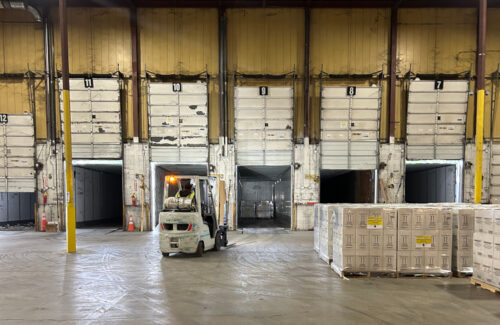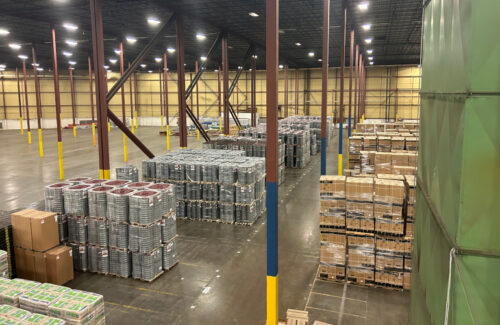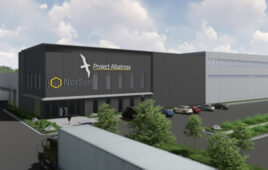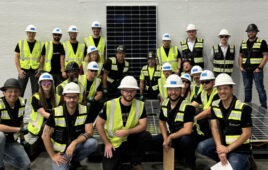U.S. solar supply chains were under more scrutiny in the past four years than ever before. Successive administrations have imposed significant tariffs on the import of solar array components. The steep tariffs imposed on solar module imports threaten to drive up prices for the components to potentially unsustainable levels.
When the Biden Administration postponed the latest rounds of module tariffs until June 2024, it set off a purchasing frenzy among solar EPCs trying to purchase as many products as possible before prices rise significantly.
One unintended consequence, however, is that EPCs need a place to store the modules they’re purchasing. Long interconnection queues are slowing project progress across the country, and instead of going directly from the supplier into the field, these modules need to be stored somewhere.
With margins tighter than ever, most EPCs hesitate to purchase or build their own warehouses. The easiest way for these firms to find warehousing that fits their needs is to consider using third-party warehousing and logistics partners. As third-party providers become more accessible throughout the United States, the solar industry can find the advantages warehousing brings to the equation.
Here are eight reasons solar EPCs should consider finding third-party partners for their warehousing needs:
1. The costs of third-party warehousing and logistics are far lower than purchasing or building their warehouses. Construction costs continue to rise, and the Federal Reserve shows no signs of lowering interest rates to make borrowing money to purchase buildings easier. Finding a third-party warehousing and logistics partner who can scale up and down as market forces change is critical.
2. Some third-party providers offer flexible-term leases — an advantage for EPCs who won’t need long-term warehousing space when the interconnection queue clears up. Companies using third-party warehouses will only pay for the space they need for the time they need it, avoiding investing capital into hiring and training their own warehousing and logistics team. This can save companies money in the long run, as they are able to quickly scale up and down in response to market demand. Additionally, third-party partners can provide expertise, knowledge and access to additional resources that EPCs may not have access to.
3. The right third-party warehousing and logistics partners can bundle services like warehouse management, kitting, sorting and customized packaging. When a partner can take some of the more mundane tasks off an EPC’s agenda, the company can do what it does best: financing, designing and building solar projects. Working with a partner who can provide those services in conjunction with the ebbs and flows of the solar industry is crucial.
4. To allow EPCs clear visibility into their inventory, reputable third-party warehousing and logistics partners have the latest inventory management technology. The more precise the inventory management, the lower the costs for EPCs trying to keep overheads low to price their projects competitively. According to a 2022 McKinsey report, companies that deploy tracking software and other technologies are twice as likely to avoid supply-chain disruptions, which can mean the difference between the success or failure of a project.
5. Third-party warehousing and logistics providers may be able to coordinate the transportation of solar components from manufacturers to project sites. This frees internal logistics teams to focus on big-picture strategies.
6. If the components come from overseas, a reliable third-party warehousing and logistics team can manage customs clearance, documentation and compliance with the appropriate import regulations. By minimizing problems as the modules come in, project timelines can shorten and deliver on time and on budget.
7. Sometimes, no matter the precautions taken, components are damaged in transit. Third-party warehousing and logistics teams can return damaged components at the direction of the EPC’s management, taking the hassle out of the process.
8. Finally, third-party warehousing and logistics partners may be able to help with the recycling or disposal of end-of-life solar panels used in projects, keeping the supply chain sustainable and efficient.
Until the solar industry stabilizes and just-in-time delivery of solar components becomes the norm again, solar EPCs will need facilities to store excess inventory. They should consider finding a reliable third-party warehouse and logistics partner to meet their current and future storage needs.
Eric Burdette is the COO of BroadRange Logistics, an industry-leading end-to-end provider of ultra-flexible warehousing and fulfillment services. Serving businesses of all sizes, BroadRange offers comprehensive short — and long-term solutions, enabling companies to effortlessly navigate the intricacies of supply chain management, including warehousing, fulfillment, and other value-added services. BroadRange has vast experience serving some of the world’s largest solar companies with their warehousing and distribution needs.







Tell Us What You Think!